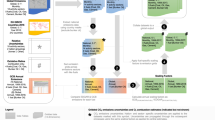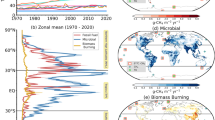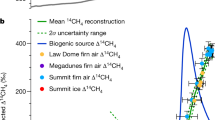Abstract
THERE has recently been considerable concern regarding the increasing consumption of fossil fuels. For example, it has been computed that up to 1950, 60 × 109 tonnes of carbon in the form of CO2 have been discharged into the atmosphere, due to industrial processes such as cement-making and the combustion of coal, oil and natural gas1,2. The changing composition of the atmosphere, and in particular its possible effect on world climate, is a matter of great anxiety. Currently, the CO2 concentrations in the atmosphere are being monitored at several places on the Earth's surface and it is generally agreed that the levels are increasing by about 1 p.p.m. yr−1 (refs 3–6). This paper points out that even bigger changes occurred in the late nineteenth century due to the sudden expansion of agriculture.
This is a preview of subscription content, access via your institution
Access options
Subscribe to this journal
Receive 51 print issues and online access
$199.00 per year
only $3.90 per issue
Buy this article
- Purchase on Springer Link
- Instant access to full article PDF
Prices may be subject to local taxes which are calculated during checkout
Similar content being viewed by others
References
Keeling, C. D. Tellus 25, 174–198 (1975).
Bolin, B. in The Physical Basis of Climate and Climate Modelling (WMU-GARP Pub. series no. 16, 1975).
Sagan, C. & Drake, F. Scient. Am. 233, 83 (1975).
Keeling, C. D., Adams, J. A., Ekdah, C. A. & Guenther, P. R. Tellus 28, 552–564 (1976).
Keeling, C. D. et al. Tellus 28, 538–511 (1976).
Pearman, G. I. Clean Air 11, 21–26 (1977).
Bolin, B. Science 196, 613–615 (1977).
Broecker, W. S., Li, Y. H. & Peng, T. H. in Impingement of Man on the Oceans (ed. Hood, D. W.) (Wiley-Interscience, New York, 1971).
Farmer, J. G. & Baxter, M. S. Nature 247, 273–275 (1974).
Freyer, H. D. & Biesberg, L. Nature 252, 757 (1974).
Wilson, A. T. & Grinsted, M. J. DSIR Bull. 220, 61–66 (DSIR, Wellington, New Zealand, 1978).
Wilson, A. T. & Grinsted, M. J. Nature 265, 133–135 (1977).
Keeling, C. D. Geochim. cosmochim. Acta 13, 322 (1958).
Keeling, C. D. Geochim. cosmochim. Acta 24, 299 (1961).
Grinsted, M. J., Wilson, A. T. & Ferguson, C. W. Earth planet. Sci. Lett. (in the press).
Green, J. W. in Methods in Carbohydrate Chemistry (ed. Whistler, R. L.) 3, 9–21 (Academic, New York, 1963).
Lamb, H. H. Nature 223, 1209–1215 (1969).
Callendar, G. S. Tellus 10, 243–248 (1958).
Manabe, S. & Weatherald, R. T. J. atmos. Sci. 32, 3–15 (1975).
Schneider, S. H. J. atmos. Sci. 32, 2060–2066 (1975).
Author information
Authors and Affiliations
Rights and permissions
About this article
Cite this article
WILSON, A. Pioneer agriculture explosion and CO2 levels in the atmosphere. Nature 273, 40–41 (1978). https://doi.org/10.1038/273040a0
Received:
Accepted:
Issue Date:
DOI: https://doi.org/10.1038/273040a0
This article is cited by
-
Soil carbon and nitrogen stores and storage potential as affected by land-use in an agro-pastoral ecotone of northern China
Biogeochemistry (2007)
-
Incorporation of Plant Residues into Soil Organic Matter Fractions With Grassland Management Practices in the North American Midwest
Ecosystems (2006)
-
Agricultural sources and sinks of carbon
Water, Air, & Soil Pollution (1993)
-
An approach to assessment of management impacts on agricultural soil carbon
Water, Air, and Soil Pollution (1992)
-
Evidence from chronosequence studies for a low carbon-storage potential of soils
Nature (1990)
Comments
By submitting a comment you agree to abide by our Terms and Community Guidelines. If you find something abusive or that does not comply with our terms or guidelines please flag it as inappropriate.



